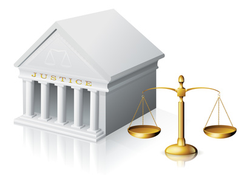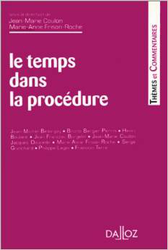
5 septembre 2023
Publications

🌐suivre Marie-Anne Frison-Roche sur LinkedIn
🌐s'abonner à la Newsletter MAFR Regulation, Compliance, Law
____
 ► Référence complète : M.-A. Frison-Roche, Circuler dans le temps pour mettre en phase Compliance et droits de la défense, document de travail, septembre 2023.
► Référence complète : M.-A. Frison-Roche, Circuler dans le temps pour mettre en phase Compliance et droits de la défense, document de travail, septembre 2023.
____
📕Ce document de travail a été élaboré pour constituer la troisième partie de la vision d'ensemble qui introduit l'ouvrage Compliance et droits de la défense.
Un premier article, 📝Connaître les pratiques pour redessiner les frontières et accroître les points de contact entre Compliance et droits de la défense dans l’enquête interne, la CJIP et la CRPC (Lignes de force de l’ouvrage Compliance et droits de la défense), constitue une présentation synthétique de l'ouvrage.
____
📝Ce document de travail a été élaboré pour servir de base à la troisième section qui, ouvrant ce livre, expose la façon générale dont on peut articuler les droits de la défense et le système de compliance, en circulant dans le temps.
____
► Résumé du document de travail : Le sujet Compliance & droits de la défense est difficile à appréhender car il donne souvent lieu à des présentations totalement opposées, qui expriment la confrontation initiale entre Compliance et droits de la défense, qui paraît irréductible. Il faut admettre cet affrontement initial, et cela est d'autant plus nécessaire qu'il s'agit d'éviter qu'il ne devienne définitif(I).
Mais dans un État de Droit les droits de la défense sont au cœur et la hiérarchie des normes impose qu'ils demeurent le privilège de tous deux qui risquent dans le futur d'être punis. Certes si l'on regarde le déroulement des évènements d'une façon linéaire, les mécanismes de Compliance relevant de l'Ex Ante tandis que les droits de la défense ne s'animeraient que lorsque les procédures répressives se dresseraient ultérieurement face à la personne, morale ou physique. La question ne se poserait donc pas même, ou d'une façon non centrale. Mais il s'agit là d'une compatibilité fallacieuse entre Compliance et droits de la défense (II.
En effet, c'est la perspective de la punition qui fonde l'attribution des droits de l'avenir. Cette considération de l'avenir non seulement permet mais oblige ainsi le Droit à "circuler dans le temps", à toujours penser par avance ce qui peut arriver demain : c'est ainsi qu'il faut penser et l'enquête interne et la CJIP et la CRPC (III). Dès l'instant que dans la pratique même de ces outils de compliance, au moment où ils se déroulent, l'on pense déjà à l'usage qu'on pourra en faire, ce pour quoi ils ont souvent été utilisés car l'enquête interne est une preuve formidable pour obtenir par la suite condamnation et/ou CJIP et/ou CRPC, la part des droits de la défense se déplace dans le temps.
Apparaissent alors plus clairement deux ambiguïtés qui affectent le Droit de la Compliance lui-même et que les droits de la défense permettent d'éclairer. La première vise la place qu'occupe le consentement de la personne qui aurait pu être protégée par les droits de la défense et qui exerce sa volonté pour y renoncer (IV). En effet, le consentement, en lien avec la volonté dont il serait l'expression, vise lui aussi l'avenir et permet à la Compliance de nouveau de prendre le pas sur les prérogatives de l'individu qui de lui-même choisit de ne pas en bénéficier. L'omniprésence du "consentement" dans la Compliance est ici éclairante... La seconde ambiguïté concerne la place du secret (V). En effet, le secret paraît être l'apanage des droits de la défense. Mais il peut aussi être l'instrument d'efficacité de la Compliance lorsque la confidentialité permet à l'entreprise de détecter et de prévenir les manquements. Il peut même constituer le But monumental même du Droit de la Compliance. Cela advient lorsque le But du Droit de la Compliance, dans lequel la normativité juridique est logée, devient la protection de l'individu, comme c'est le cas pour les informations à caractère personnel. Ce qui guide le Juge européen, suivant l'humanisme qui fonde le Droit européen de la Compliance pour trouver cette juste mesure, est la protection et l'efficacité suivant que l'information est donnée et qu'elle n'est pas donnée.
____
🔓lire le document de travail ci-dessous⤵️
Mise à jour : 15 mars 2023 (Rédaction initiale : 18 mai 2021 )
Publications

► Référence complète : M.-A. Frison-Roche, "Place and rôle of Companies in the Creation and Effectiveness of Compliance Law in Crisis", in M.-A. Frison-Roche, (ed.), Compliance Monumental Goals, série "Compliance & Regulation", Journal of Regulation & Compliance (JoRC) and Bruylant, 2023, p.
____
► Résumé de l'article : This article has a very topic: the place of private Companies, regarding the chapter's issue: "the ordeal of a crisis". The crisis constitutes a "test" it brings evidence. Let us take it as such.
Indeed, during the health crisis, Companies have helped the Public Authorities to resist the shock, to endure and to get out of the Crisis. They did so by force, but they also took initiatives in this direction. From this too, we must learn lessons for the next crisis that will come. It is possible that this has already started in the form of another global and systemic crisis: the environmental crisis. In view of what we have been able to observe and the evolution of the Law, of the standards adopted by the Authorities but also by the new case law, what can we expect from Companies in the face of this next Crisis, willingly and strength?
____
🚧Read the bilingual Working Paper, with more developments, technical references, and hypertext links.
____
📘Lire une présentation générale du livre, Compliance Monumental Goals, dans lequel l'article est publié.
____
► lire les présentations des autres contributions de Marie-Anne Frison-Roche dans cet ouvrage :
📝Compliance Monumental Goals, beating heart of Compliance Law,
📝Definition of Principe of Proportionality and Definition of Compliance Law,
📝 Assessment of Whistleblowing and the duty of Vigilance
________
27 novembre 2021
Conférences

► Référence complète : Frison-Roche, M.-A., présidence de la session "The temporal dimension: Imminence and Intertemporally", in colloque Climate Change Cases before National and International Courts Cross-fertilization and Convergence, 27 novembre 2021, Paris.
____
Lire le programme complet du colloque (en anglais)
Résumé de la présentation du panel : The specific topic of our panel is the “temporal dimension” of the judicial cases of Climate change.
We shall listen to two great experts on this topic, which is Time.
Listening the other previous speakers, I understand how this topic is important, because Climate Change requires an immediate action and it create a political issue, because everyone comes before courts.
A basis and fundamental problem, because the times are not adjusted.
let's come back to basic notions, to have three times : “past, present, future”.
The issue of Climate Change is in the Future, the necessity of Action is in the Present and the basis temporal question is to know if Courts are the bodies adequate to responde ; maybe it is inevitable that Judge must be recreate their office because the time of the classical judicial office is the Past.
Immediately, this simple et huge problem appears : in a classical repartition, the judge is the legal character to intervenir for the Past, the present (maybe is for you and me), and the future is the time for the State, and more precisely for the Parliament.
But the climate change is a huge topic, not in the past, not in the present, but in the future.
Therefore a gap exists between the time of the topic and the time of the court before the case is explained for obtaining a solution : how to give a good answer ? Judge maybe must travel in time, from past to future …. Maybe, he must, but might he?
Classically, the judge can anticipate a very next future, but not the more distant and systemic future. Climate change belongs to the second one.
This is why the title of this panel is non only about the necessity to take in consideration the “imminence” but also the “intertemporally” : maybe court are the sole able to create this intertemporality between Past and Future, and by this way to obtain from States and companies to do something immediately !
By two legal ways.
Courts can stay in Past, supervising States, if they dispose of effective legal decisions taken by States in the past about Climate Change (essentially Paris Agreement, for instance transposed in the French legal system by a formal law). This is why an efficient judicial solution would be the possibility for the courts to oblige State to implement their more or less committment they had taken in the past for the future (as the Conseil d’Etat did in the Commune de Grande-Synthe Cas Law).
Even for that, the courts must adopt a creative notion of what is a commitment from a State through a Law... ; as they must do about private companies comitment (in their codes of conduct or soft law of corporate social responsability).
But what to do if States didn’t take such commitment ?
Some can allege Courts are not Parliaments and are not legitimate to rule for the future … It is a political issue, a very classical one but very accurate for Climate change (where States and companies are face to courts...) and maybe And as our colleague said, judicial system is quite technically weak to concretize human rights.
Therefore, the second way, more innovative, est the new use of Tort Law : no more a liability Ex Post, but a responsibility Ex Ante. In every legal system, even in Civil Law systems, Tort Law is conceived by courts (for instance in French Law).
If the new reasoning is conveived in Ex Ante, Tort Law must be a set of legal tools to reach the monumental tools to reach the "Monumental Goal" (being by nature future) which is the Climate Change stopping.
In this teleological reasoning, the admissibility and the choice remedies, must be adapted to obtain what is central : the effectivity and the efficiencicy.
In this sens, the judgement between two parties (which was an Ex Post act) may be conceived as an systemic efficient action (which was an Ex Ante act), because it must be.
_____
14 janvier 2015
Blog

Oublions un instant l'objet même de l'arrêt AZF et limitons la lecture à la question procédurale tranchée par l'arrêt rendu par la chambre criminelle de la Cour de cassation le 13 janvier 2015.
Celui-ci est très remarquable et mérite pleine approbation en ce qu'il affirme l'obligation des juges de respecter l'impartialité de l'institution juridictionnelle, mise à mal si les personnes qui ont à faire à elle peuvent établir un "doute objectif" concernant l'impartialité d'un juge.
A travers cette affirmation, c'est un jeu de présomptions, la principale étant la présomption de l'impartialité du juge, que la Cour de cassation établit, mettant en juste mesure les charges et les objets de preuve en la matière.
Lire ci-dessous un commentaire développé de l'arrêt.
16 juin 1999
Publications
14 avril 1998
Publications
Référence : TGI Paris, 5 novembre 1997, D.1998, p.9 s., obs. M.-A. Frison-Roche.
24 juillet 1997
Publications
13 novembre 1996
Conférences
27 avril 1996
Publications

5 décembre 1995
Conférences
14 décembre 1994
Conférences
11 mai 1993
Conférences